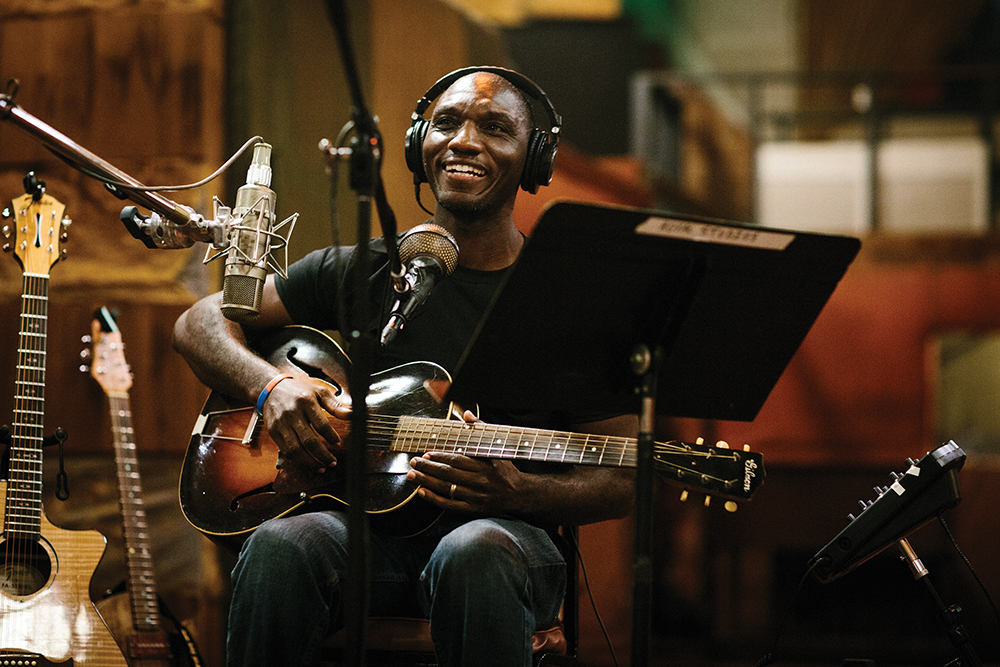“The other night I ate at a real nice family restaurant. Every table had an argument going.” — George Carlin
The term “family values” is bandied about in political discourse a great deal, but what it really means is hard to pin down. While some bemoan the loss of the family life portrayed in Cold War textbooks, a look at the institution at street-level reveals a more complex picture. For many, leaving the family can have a liberating effect, as with countless alienated youths, be they counterculture or LGBTQ, who establish their own “family” of friends. And that’s not just a contemporary phenomenon. Memphis Minnie regularly ran away from the hard scrabble farming life of Walls, Mississippi, to play on Beale Street in the years before World War I, eventually staying gone for good while still in her teens. It all started when they gave her a guitar.
And yet families need not be so oppressive, as so many of us know. Indeed, families are a distinctive feature of this region’s musical heartbeat. The late Herman Green’s father played in W.C. Handy’s band, and his stepfather was a pastor whose church piano further sparked Green’s love of music. Phineas Newborn Sr. led a local orchestra that fostered the storied careers of his sons Calvin and “Junior,” the latter becoming one of the 20th century’s greatest pianists. Al Jackson Sr. fostered the talent of Al Jackson Jr., celebrated worldwide as the pulse behind Stax Records. From that same milieu arose Rufus Thomas, his daughters Carla and Vaneese destined to become celebrated singers, his son Marvell a distinguished soul pianist, composer, and arranger.
Though a full listing of contemporary performers with musical family roots would take a book, we highlight three such artists here whose kin inspired them. Once upon a time, people talked about the “generation gap,” with rock-and-roll marking the hard divide between young and old in the ’50s and ’60s. Now, in the 21st century, it’s all about the Generation Jams.
Meet the Burnsides
True, Cedric Burnside’s latest release, I Be Trying, might be seen as the culmination of his family’s story, grounded in the talent and guidance of his legendary blues-playing grandfather, R.L. Burnside. But Cedric’s latest, perhaps the greatest of his career so far, also represents the confluence of several families. Around here, when families befriend families, you wind up with a lot of kin.
The haunting collection of sparse blues, their unique aesthetic echoing African bluesman Ali Farka Touré at times, was produced by Boo Mitchell, himself the keeper of a family legacy. Willie Mitchell went from success to success as a band leader, then as a producer of megahits for Hi Records; he treated and taught the three musical Hodges brothers like family, and they became the Hi Rhythm Section. Along the way, Willie raised his grandson Boo as his son. “Every night he’d come home, I’d be messing around on the piano, and he’d come lean over my shoulder, those whiskers hitting me, and show me some stuff,” Boo recalls.
Now Boo co-manages Willie Mitchell’s Royal Studios, and working on Burnside’s album took on a uniquely cathartic aspect after Boo’s son fell victim to a vicious gun attack that left the Mitchells wondering if he’d ever walk again. “I didn’t know I Be Trying was going to become the soundtrack to my life,” Boo reflects. “When that thing went down with my son, all I kept hearing were Cedric’s songs. ‘The world can be so cold. …’ It was stuck in my head for a long while. Because he means that stuff. It is not an act.”
Cedric has inherited the gravitas and heartfelt approach to the blues of his grandfather. “I was born into this music,” Cedric says. “It was in my blood when I was birthed into this world. I have a very musical family. My Big Daddy [grandfather] and Big Mama [grandmother] had 13 children. Just about everybody turned to music, to have as their passion.
“My first instruments was the cans and buckets. We’d get done cooking, clean all the grease outta the jug, and I’d use that jug for a drum, you know? And my Big Daddy and my dad would play house parties around, and somehow I just found the courage to step up on the drums when they took a break. Instruments were all around me as a kid.”
Having been raised in his grandparents’ home, long before he mastered guitar, drumming for R.L. Burnside gigs at juke joints was an easy jump for Cedric. “It was fascinating, being that young, knowing I wasn’t supposed to be in the juke joints, me or my Uncle Garry. I was 10, he was 12, and we were in the juke joint! But there was something so special about that. Being kids that young, we’d know that we weren’t supposed to be there, but every grown-up in there welcomed us. They would hide us behind the beer coolers when the police came in because if we left, they didn’t have no band to play music! It was really, really cool, just knowing that you were one of the cool kids, at the juke joint with all grown-ups. It was scary, it was weird, and it would get your adrenaline pumping. You think of any scenario, and we probably went through all of those at that juke joint.”
Nowadays, Cedric is able to pay the tradition forward. “My youngest daughter, Portrika — she just turned 16 — sings on ‘I Be Trying.’ She always loved to sing, which makes me proud. And I’m just trying to feed her all I can give her, you know? While I’m here to do it.”
Direct descendants aside, for Cedric, “family” was never merely the classic nuclear arrangement, but an extended flock, some not even related by blood. Among the latter were Jim and Mary Lindsay Dickinson and sons. “With some musicians I play with, I have been around them for so long that they are like family to me. Like the North Mississippi Allstars. Luther and Cody Dickinson, we’ve been around each other since we were kids. Luther was the big brother of the group, the first one who could drive. That’s 30-plus years we’ve been knowing each other. So they are really like family to me. Even though we wasn’t blood. Just the closeness that we had made us family.” To this day, when Luther makes a cameo on Cedric’s album, you can hear the telepathy between them.
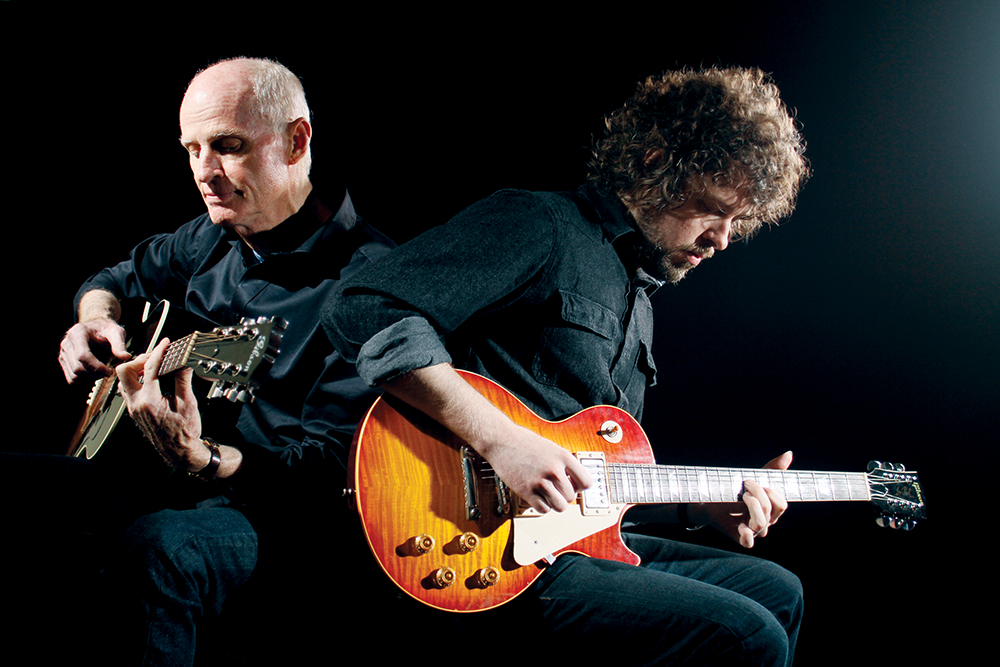
Meet the Selvidges
It turned out the Dickinsons weren’t the only family bonding with local geniuses of the blues and forging whole new family legacies. While Jim Dickinson was an early champion of under-recognized blues musicians of the area, he wasn’t alone. Standing right by his side at those first blues festivals of the ’60s was Sid Selvidge, whose family in Greenville, Mississippi, had not been particularly musical, but who nonetheless made his own way in the musical world of Memphis with the raw talent of his voice and fingers and his deep understanding of the blues and other song forms.
Today, Sid’s son Steve carries the tradition forward, best known as a guitarist in The Hold Steady. He says his early love of the guitar was sparked by his father’s encouragement — albeit with a light touch. “He was absolutely perfect,” recalls Steve. “Because he was not a stage dad. He was just so smart about it. He made everything available but didn’t push it on me or my brother. There was music around a lot, but all he offered was his enthusiasm.”
Showing young Steve a handful of chords was enough to get him started; from there, the son taught himself licks by rock gods like Led Zeppelin while the father looked on, adding only the occasional detail. “The biggest thing he showed me was open-G tuning and how to play ‘Cassie Jones’ and stuff. And while I played, he’d be shouting at me from downstairs, ‘It doesn’t go to the V chord!’ That’s literally something that happened,” laughs Steve.
Perhaps more than the technical niceties, Steve picked up a unique feeling for the blues via his father’s friends, namely the composer of “Cassie Jones” himself, the great Furry Lewis. “I only got fully hip to North Mississippi when Luther started digging deep down in there. My dad knew who R.L. Burnside was, but we hung out with Furry because they were friends. I have lots of memories of going over there and sitting on Furry’s bed and him being really sweet and really cool. And as he got older, the visits fell off a little bit. And I got into other things. I was still in single digits when he died.”
But there were other friends to learn from. As it turned out, Sid Selvidge, Jim Dickinson, Lee Baker, and Jimmy Crosthwait had a little band known as Mud Boy and the Neutrons. They were mostly local heroes but, by forging their own brand of heavy roots rock, have become highly regarded in hindsight. And the band itself was a kind of family. “They were still holdling on to the ethos of the counterculture,” muses Steve. “Even though they were middle-aged men by that point, there was still that ‘don’t trust anyone over 30’ vibe. I remember the smell of marijuana, and it was all very attractive. It was all connected with fun.”
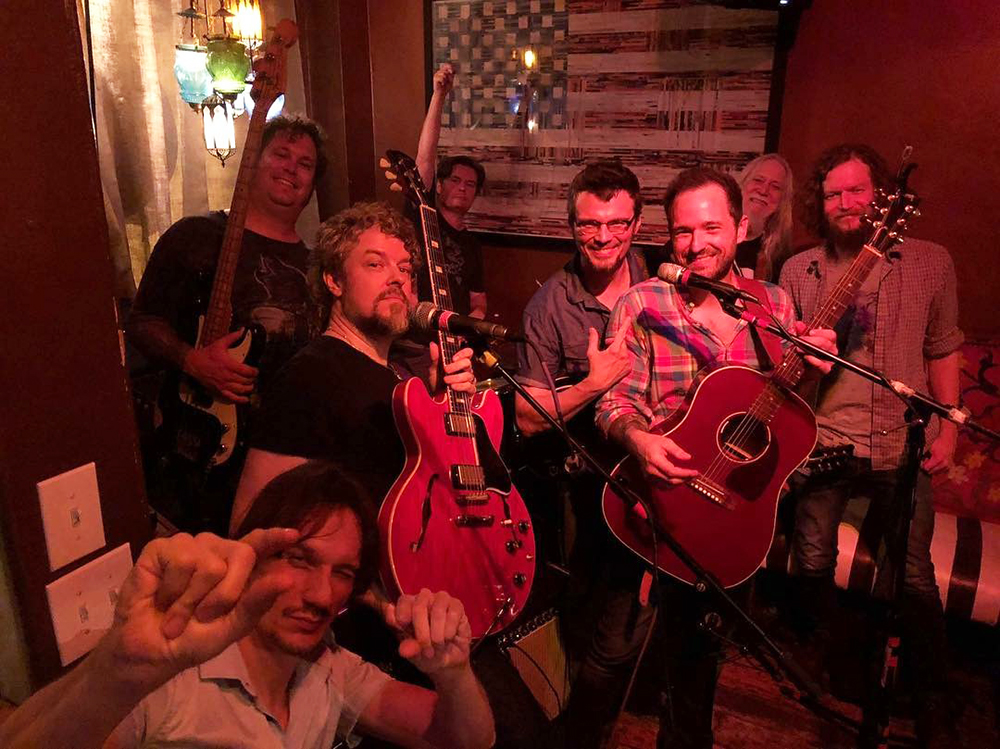
Indeed, for young Steve, the visceral elements of musicianship were as alluring as the actual playing. “I can remember on Sundays, or after the weekend, I would open my dad’s guitar case, and this almost visible plume of aroma would come out, a cigarette smell, basically. Which is not that great, but it was really intoxicating as a kid. I would open it up and you could almost see the vapors, the smell of the bar. I was like, ‘Wow, man!’ I wasn’t even able to put it into words, but it was like, ‘This is a working musician’s instrument. He did something. And now he’s done for the weekend.’ It was like battle scars and it took on its own energy. It was almost like a living thing.”
Today, with Crosthwait the only Mud Boy member still living, Steve, Luther and Cody, and Ben Baker carry on that living thing as Sons of Mudboy, playing their fathers’ classic repertoire at free-ranging gigs that often include an extended family of other players. As he continues playing his father’s songs, Steve’s appreciation for what he achieved only grows. “Later, I got hip to how intricate and deep my dad’s self-accompaniment on guitar was. Originally I was looking for flash and guitar solos and crazy stuff,” Steve recalls, “but later I realized his whole playing and singing by himself was so hard to do. I can remember being in the first grade and being asked what your parents do. I said my dad was a magician. And maybe that was true, after all.”
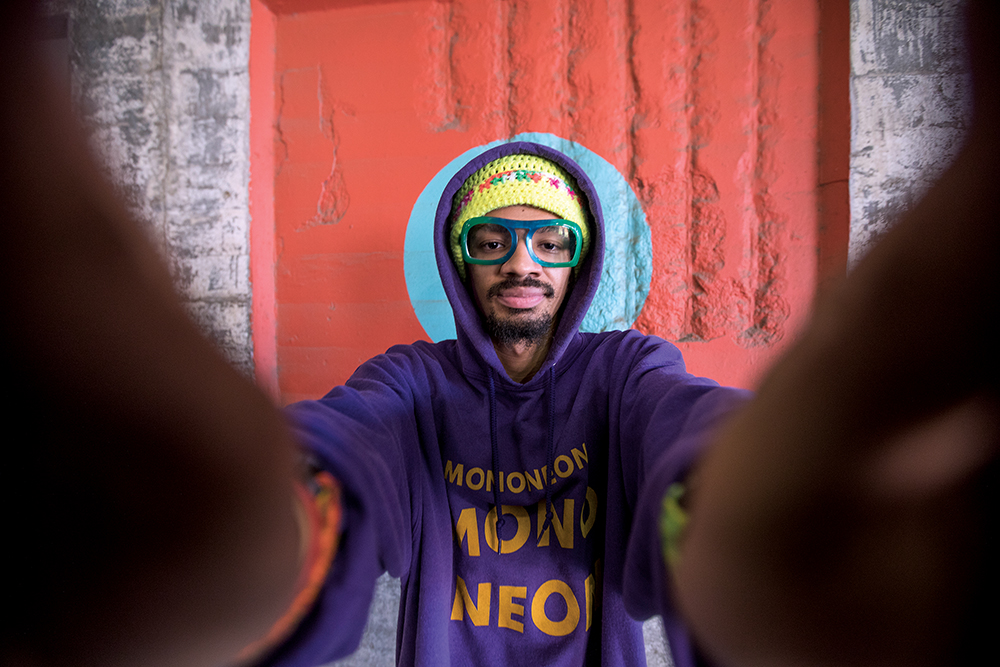
Meet the Thomases
Steve and Sid Selvidge came to play together, including the time Steve accompanied his father at Carnegie Hall at age 19. Luther and Cody also joined their father Jim starting in their teens, Jim often dubbing the Dickinson family outfit the Hardly Can Playboys. But one local virtuoso didn’t have a chance to do that until very recently. Dywane Thomas Jr. bears the name of his father but mainly admired him from afar as a kid. “My dad, the bassist Dywane Thomas, is my first music hero,” writes the son in an email. To clear up any confusion, the son goes by a different name: You likely know him as MonoNeon, also a bassist, so renowned for his jazz, funk, and soul chops that he even played with Prince in the Purple One’s final days.
“Even though my dad moved to Europe when I was young,” MonoNeon writes, “his influence was just in me (the blues, funk, Southern-soul). Till this day I’m always searching for records my dad played on. I actually found an old vinyl record my dad played bass on with J. Blackfoot, entitled Physical Attraction (1984).”
Searching for records involving his family has been a long-time obsession for the bass wunderkind, for the family ear for music goes beyond his father. “My grandfather, Charles Thomas, a jazz pianist, was a later influence on me. I became aware of who my granddad was musically in my early teens. My granddad played with Ron Carter and Billy Higgins on the album called The Finishing Touch! by the Charles Thomas All Star Trio. I used to listen to those recordings a lot during high school wishing I had a chance to play with my granddad Charles.”
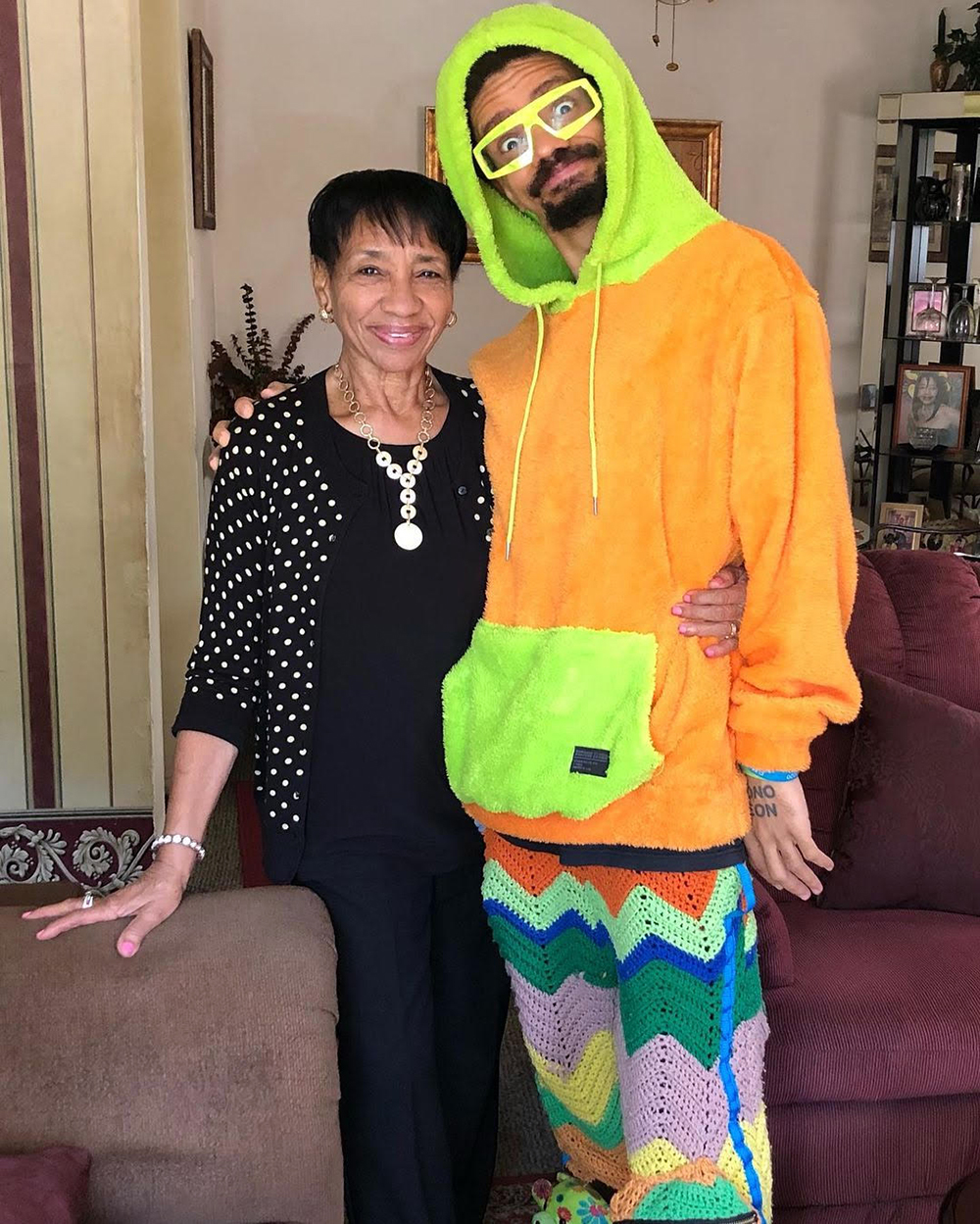
More recently, MonoNeon has taken to celebrating his grandmother Liz as well. It’s most obvious in the song “Grandma’s House,” on his 2021 album Supermane, a Funkadelic-tinged celebration of piling into the car to visit his grandmother and eat her fine cooking. “I’ve always just wanted to play some music with Grandma Liz,” he reflects. “I used to go to choir rehearsal with her with my bass and play. The whole thang with me and my grandma jammin’ together started when my mom brought her over to come hang and I told my grandma, ‘Let’s do a quick jam thang’ on a song she use to sing in church, ‘Oh, When I Come to the End of My Journey.’ Since I’ve started singing more, I’ve noticed I kinda sound like my grandma. My early gospel influence comes from going to the Baptist church with my grandma and aunties. Now I’ve just taken all those influences and made it neon I guess.”
As MonoNeon has become more celebrated, he seems to value family more than ever in his work, and recently he too was able to accomplish what the Selvidges and the Dickinsons did: create music with his father, keeping the cycle of family influences ebbing and flowing — “a living thing,” in the words of Steve Selvidge. As MonoNeon relates, “Me and my dad had a chance to record and jam recently at Niko Lyras’ Cotton Row Studio, with Steve Potts on drums. That was a dream I had to bring to realization in some way.”
Cedric Burnside plays an album release party, featuring Luther Dickinson, at B.B. King’s Blues Club, Wednesday, August 25th, 7 p.m. $20. He plays the 2021 Memphis Country Blues Festival at the Levitt Shell Thursday, October 7th, 7 p.m. $35.
Steve Selvidge plays with Big Ass Truck at the Levitt Shell, Saturday, September 11th, 7 p.m. Free.
MonoNeon plays Railgarten, Wednesday, September 1st, 8 p.m. $10.
